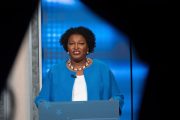
A recent Associated Press report states that Obama’s plan would at best reduce the unemployment rate by a single percentage point in time for the November 2012 election, after which it would become “a drag on the economy” to the point that “by 2015, the economy [will be] in the same place as now, as if there were no jobs package.” Taxes, meanwhile, will have permanently increased by some $1.6 trillion.
Obama has been careful not to make his own prediction about how many jobs his bill would create, fearing that he would only be sealing his own fate if reality failed to live up to his forecast. Instead, he turned to Mark Zandi, chief economist of Moody’s Analytics, who estimated that the bill would generate about 1.9 million new jobs in 2012, or 158,000 a month, leading to a one-percentage-point reduction in the unemployment rate and a two-percentage-point increase in the gross domestic product. The AP notes that Zandi’s jobs estimate “is somewhat higher than private analyses that suggest the plan would create 100,000 to 150,000 jobs a month.”
Of course, other economists, most notably those of the Austrian school, recognize that the government cannot create jobs at all. It merely transfers jobs from the private sector, where they exist to meet consumers’ needs, to the public sector, where they exist to pursue politicians’ passions, chief among them buying enough votes to be returned to office. Moreover, for each job “created” in the public sector, probably multiple jobs are destroyed in the private sector owing to government’s enormous overhead. In Seattle, for instance, $20 million in federal handouts for weatherizing homes produced a whopping 14 jobs. One can only imagine how many productive, private-sector jobs could have been created or saved had that cash been left in private hands.
Even assuming, however, that Obama’s jobs bill would be a net benefit to the economy, the fact remains that Zandi’s forecast is based on some rather optimistic assumptions.
First, he said he assumed that “the president’s entire package is passed by the end of the year,” which the AP points out is “a slim prospect given the current divided leadership in Congress.”
Second, he posited “that there are no other budgetary policy changes,” saying he “assumed that it would be paid for” but did not know at the time how Obama planned to do that. The President has since revealed that he is seeking numerous permanent tax increases totaling nearly $1.6 trillion over a decade; and though the portions of the bill that allegedly create jobs (primarily payroll tax cuts and infrastructure spending) will be in effect for only a short while, the tax hikes will remain in perpetuity.
Third, Zandi’s “forecast does not leave any room for a new recession,” the AP writes. “If that happens, all bets are off.”
Despite the unlikelihood of his presuppositions, Zandi is “still sticking with his forecast, mainly because the stimulus in the plan … would come in 2012 and be paid for later,” according to the AP. However, says the news service, even if Zandi turns out to be 100 percent correct, Obama’s bill would create only enough jobs to get him through the election, after which the employment situation — though not the tax situation — would return to its pre-American Jobs Act status:
Zandi said his job-creation figure only applies to 2012.
“Beginning in 2013, and certainly into 2014, the plan is a drag on the economy because the stimulus starts fading away,” he said. “So by 2015, the economy is in the same place as now, as if there were no jobs package.”
Americans stand to gain little from Obama’s bill except a permanent increase in their income taxes. Republicans in Congress, who have announced their opposition to the bill, stand to gain even less by agreeing to any part of it (except possibly the temporary payroll tax cuts). If they were to enact the legislation, they would at once forfeit any claim to principle that they still retain and hand a President of the opposing party a potential ticket back to 1600 Pennsylvania Avenue.



